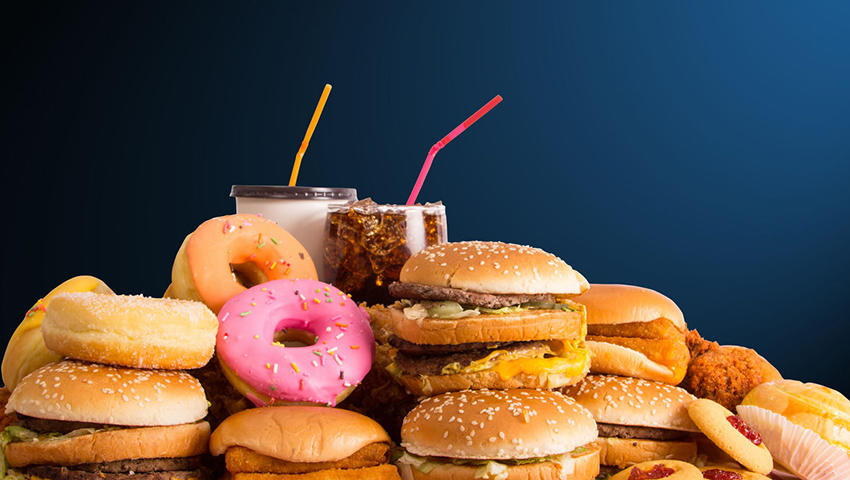The human body is pretty amazing - it has the ability to generate energy, repair itself, adjust its intake and expulsion all kinds of materials, and more. Think of it like a sophisticated computer - let's say you just bought a top of the range laptop. It would be important to you to look after it. You would be careful about what data went into the laptop and what power source you used.
When it comes to your body, however, chances are good that you do not give it the same consideration. Like a laptop with a virus, "bad" fuel that is fed to the body will interfere with its operating system and may even cause it to crash.
7 Of The Worst Foods For Your Body
Here is a list of foods that can significantly harm your health and that you need to, whenever possible, restrict how much you eat or even avoid altogether.
1. Added Sugar And High Fructose Corn Syrup
I am sure that by now you know that added sugar is public enemy number one. Not only does it provide no nutritive value at all, but it can actually become addictive - the more sugar you have, the more you want. Add into that the fact that it has also been linked to the development of some of the biggest killers of our age - diabetes, cancer and cardiac disease - and it comes as no surprise then the recommendation is to curtail your intake. To really add insult to injury, sugar also has a detrimental effect on your looks - not only can it cause you to gain weight, but it can also make you age faster.
Fructose is especially bad - with normal glucose, if you eat enough, you will feel full - fructose, on the other hand, will not have the same effect.
So we all know sugar is bad for us, but most of us will carry on eating it. Sugar has been proven to act on the same centers in the brain that narcotics do - you get a sugar high and become addicted to it. It has been proven to be almost as difficult a habit to kick as cocaine. Think about it - ever tried to eat only one biscuit?
Combine the addictive nature of sugar and the fact that you do not feel full after eating it and you can see exactly how this disastrous cycle works.
What it boils down to: It is best to kick the sugar habit - stop any sweetened foods from passing your lips. Watch the product labels to see how much sugar is in the item. Things like sodas, fruit juices, candies, etc. need to be thrown out. Even "natural" sweeteners like Agave are no good.
2. Grains - Especially Gluten
More and more people these days are finding that there are sensitive to the gluten in food. You may not have Celiac Disease but you could still have a gluten sensitivity. Look at the way you feel after eating bread - food should energize you. If it does not, that could mean that you need to cut gluten out altogether.
The proponents of whole wheat also have a lot to answer for - for those with gluten intolerance, or those who are unhealthy, whole wheat is bad news. It has been proven to increase LDL levels by over 50%. Whole wheat also figures near the top of the glycemic index meaning that it can cause a spike in blood sugar, followed by a big crash - causing you to crave even more.
There is a growing amount of research that shows that gluten intolerance is actually pretty widespread and may even be the norm rather than the exception. Studies have also shown that it can have pretty negative effects on the digestive tract and can negatively impact the health of your whole system.
Researchers have been very interested in the effects of diets that eliminate most carbohydrates. The results at this point indicate that those who want to slim down or who have a sluggish metabolism should steer clear of any grains altogether. (Grains feature among the foods with the highest level of carbs.)
Should you be physically active or should you not have excess weight to shed, studies indicate that you still need to eliminate gluten but that you can eat oats and rice - these are gluten free.
And don't worry that you are missing out on nutrients by cutting out grains - all nutrients that can be found in grains can also be found in veggies and meat.
What it boils down to: If you want to be healthier, cut gluten out of your diet - wheat is one of the worst culprits. Once you get to your goal weight, you can reintroduce grains such as rice and oats in moderation.
3. Trans Fats
Two decades ago, margarine was hailed as the healthy substitute for butter - after all, the calorie count was so much lower and the fat was unsaturated. Now, however, we know better - we now know that trans fats, which are listed as "hydrogenated" fats, such as those in margarine, are really unhealthy.
These fats are "hydrogenated" to prevent them from going rancid quickly and the process enables them to take on a solid format at normal temperatures. The problem is that the process changes the chemical composition of the fats and creates a toxic product.. While it won't kill you to eat it occasionally, long term consumption can result in an increase in the LDL cholesterol (the bad type) and a concurrent lowering of HDL cholesterol (the one that is good for you). This also leads to an increase in visceral fat and consequently, severe health issues.
What it boils down to: Trans fats have no place in a healthy diet - there is no reason to eat them.
4. Seed, Vegetable Oils
Most healthy diet plans go on about how good seed and veggie oils are for you. The truth is that oils like corn oil, for example, are not at all good for us. As a species we simply haven't had enough time for our bodies to learn how to deal with these oils.
The problem is that these oils are a great source of Omega 6. Whilst this sounds healthy, the truth is that we need a lot more Omega 3 than Omega 6 and, if the proportions are not right, neither will do much good. Going overboard on the Omega-6 without upping the dose of Omega 3 can cause painful and dangerous inflammation in the body - widely acknowledged as one of the leading causes of illness.
These oils also contain a high proportion of polyunsaturated fats and these tend to be volatile oxidizing easily.
What it boils down to: Omega 6 needs to be avoided where possible. It is only needed in small amounts. Be sure to get the right dose of Omega 3 instead.
5. Artificial Sweeteners
When it comes to empty calories, artificial sweeteners are probably one of the worst products out there. Research has shown that regular use of artificial sweeteners can result in preterm delivery and a number of the so-called lifestyle diseases such as diabetes and metabolic syndrome. Long-term use has been linked to weight gain as well.
While this research did not conclusively prove that the artificial sweeteners were the cause of illness, they certainly highlight that the potential reward for using these products is eclipsed by the potential risks.
Stevia is a natural product and the only sweetener that can be safely used. It may even help to regulate your blood sugar levels and blood pressure.
What it boils down to: Only use Stevia if you need to sweeten up your food or drink. Avoiding using any sweeteners will get you first prize in the health stakes.
6. If It's Called "Diet" Or "Low-Fat" Give It A Miss
Marketers know that we want to eat food that is good for us. They play on this by touting low fat or vitamin-enriched foods as healthy. What they fail to mention is that these foods usually have far too much sugar or gluten in them to be good for us. After all, take out the fat and you need to add something to enhance the flavor - sugar is usually that tool. Just go take a look at that "healthy" cereal you bought for your kids - I'll bet you'll be amazed at how much sugar it contains.
If you're looking to losing weight safely, try a plant product which has natural metabolism boosting properties.
What it boils down to: Ignore the marketers and make your own decisions - Become an expert at reading food labels to get the best foods for your family.
7. Heavily Refined Or Processed Foods
For best health, you need to eat foods that are as close to their natural state as possible. Processed foods are among the unhealthiest foods that you could choose for your family. They are likely to contain high levels of sodium and sugar and, due to the process used, relatively little in the way of nutritive value. Then there are all the preservatives thrown in as well.
Again read the label - if there are words that are unpronounceable or that you cannot understand, put it back on the shelf.
Look at Mother Nature's "ingredients" list - an orange is an orange, not a list of chemicals, etc.
Safest of all is to avoid any foods that were produced artificially.












